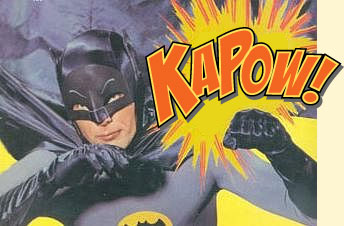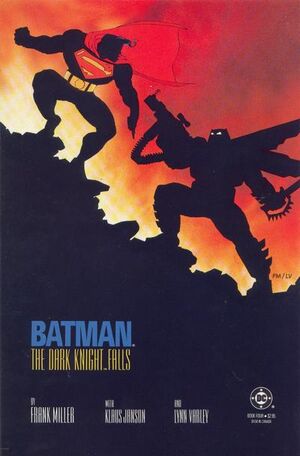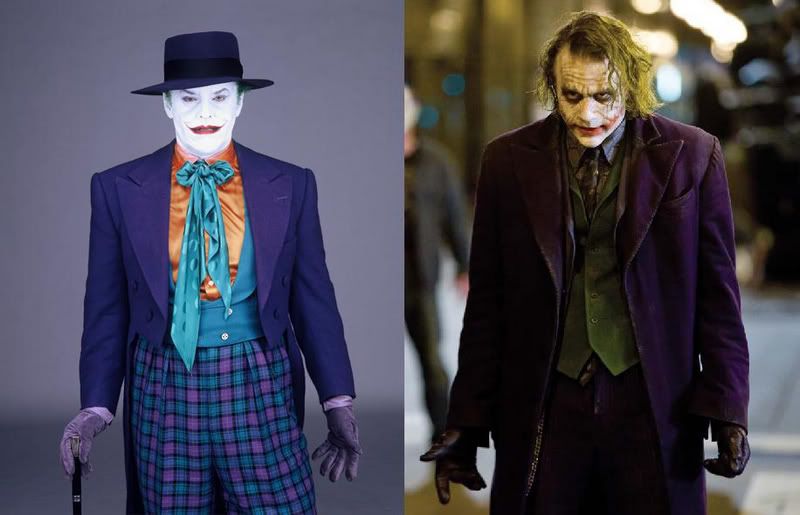Time may change me...
 |
| Christian Bale reinvented the celluloid version in Christopher Nolan's Batman Begins (2005) |
A critical difference between comic book protagonists, especially superheroes, and their counterparts in literature is that the former are practically immortal. The obvious reason for this is that books are seldom serialized, while most comic books are. Therefore, it is understandable for the personalities of comic book heroes to evolve over time, and sometimes end up as the polar opposite of what they started out as. This typically happens in cases where more than one writers contribute to the comic, and more often than not one or more of them start drifting towards mediocrity. The character is then revamped to renew the waning interest of readers and/or add a new dimension to the character's makeup.
Characters like Tintin and Asterix, and their entire supporting cast, were very tightly knit by their creators and retained their essential qualities all through their "careers". Their enduring popularity is largely due to the extremely professional and well-developed "script" of the comics. While Tintin relied on the continuous success of a formula that struck a chord with the readers, Asterix surprised its audience by incorporating sci-fi/fantasy elements into the stories. But none of these witnessed a significant change in the portrayal of the leading protagonists. On the other hand, collaborative efforts such as Archie Comics tend to develop a loose outline of a character, and keep revising and revisiting it as and when the storyline demands. In case of superhero comics, it is relatively easier to add a novel hue to the character's personality. In many cases, it is as simple as adding a new superpower to his repertoire. Other than this, general revamp tactics include new origin stories, new love interests, and in cases as extreme as DC's Crisis on Infinite Earths, new universes.
The curious case of The Bat
As for Batman, one can argue that the murder of his parents was an accident that altered him psychologically, in a way similar to, though not the same as Spiderman. Be that as it may, a psychological change always leaves a lot more wiggle-room for reshaping the character. Spiderman's accident gave him superpowers, Batman's gave him nightmares.
The early era
But we're getting ahead of ourselves. To begin with, Batman was created as a typical private detective of the 1930s, with an intense hatred for criminals. He was born in the era of pulp, and the influence was clearly visible. In many ways, he was quite similar to Sandman (the original pulp detective of the 1940s, not the protagonist of the Neil Gaiman series or the Spiderman villain). He was bitter towards a world that took his parents from him at an early age, and this served to fuel his brooding persona. It is interesting to contrast the seedy surroundings of Gotham in which he operates with the dazzling skyline of Superman's home turf Metropolis. |
| Batman's first appearance in "Detective Comics" (May 1939) |
However, the problem with a character that reflects an era is that it needs to change when the era changes. And so, in the years following World War II, DC Comics "adopted a postwar editorial direction that increasingly de-emphasized social commentary in favor of lighthearted juvenile fantasy." Once his environment was changed to a more cheerful one, there was no way Batman could continue with his dark and menacing image. Instead, he too became a boy scout but with a costume that now seemed even funnier than Superman's. He got himself a teenage boy as a sidekick, and it just got worse from there on. Interest in the character waned, because the readers already had a superhero who was much better at being a goody-two-shoes. As if this wasn't enough, psychologist Frederic Wertham criticized Batman comics for their supposed homosexual overtones and argued that Batman and Robin were portrayed as lovers. By the latter half of the 1950s, female characters such as Batwoman and Batgirl were also introduced to make the comics more warm and sunny. Batman also became a part of the Justice League of America around this time (1960 to be exact), which further reinstated his image as a "regular" superhero.
The rapidly declining popularity of Batman forced DC to introduce the "New Look" Batman in 1964. The detective-oriented stories returned, and the campy sidekicks were retired or killed off. At this point, one might have thought that Batman was returning closer to his original portrayal as a superhero with dark shades. But Adam West had other ideas.
The darkly "sunny" times
The Batman television series, which debuted in 1966, is now remembered as the worst thing to ever have happened to the franchise. But it was immensely popular in its time, and this drastically impacted the image of the character in comic books too. Adam West's Batman was an unfit comic vigilante in an embarrassingly tight costume, who slid down a pole a la firemen to reach the Batcave, and the screen flashed "KAPOW" when he punched criminals. |
| The stuff of Batman fans' nightmares, Adam West as Batman in the 1966 TV series |
He was a sad sad parody of his dark brooding former self. Robin as his sidekick was even more of a joke, figuratively as well as literally, and most of his sentences started with "Holy" and ended with "Batman". Although initially successful, as most parodies are, the show as well the comics eventually lost its audience. As the comic editor Julius Schwartz himself said, "When the television show was a success, I was asked to be campy, and of course when the show faded, so did the comic books."
By the late 1960s, a conscious effort to distance the character from this comic image had started through the collaboration of writer Dennis O'Neil and artist Neal Adams. Batman once again found himself in grim surroundings, investigating dark, dirty cases, and sick criminal minds. Some of the stories had a gothic feel to them and nearly bordered on horror, as the readers were made to realize once again that the bat costume is not supposed to be funny. However, the popularity of the franchise continued to drop throughout the 1970s and early 1980s, until some lifelong fans and graphic novel veterans decided to do some damage repair.
The resurgence of the anti-hero
 |
| Death of the Joker in The Dark Knight Returns (1986) |
 |
| The epic face-off that was the highlight of The Dark Knight Falls |
Alan Moore continued this dark trend with 1988's 48-page one-shot Batman: The Killing Joke, in which the Joker, attempting to drive Commissioner Gordon insane, cripples Gordon's daughter Barbara (Batgirl), and then kidnaps and tortures the commissioner, physically and psychologically. Moore continued the theme of Batman being the reason for Joker's existence and vice-versa. In fact, the last few panels, with the two arch enemies laughing like madmen over a silly joke (the Killing Joke) exemplifies just how beautifully twisted this superhero really is.
Following this, the character has essentially stuck to its image, despite minor variations. The 1988 release A Death in the Family and 1993's Knightfall are good examples. Although the artwork was not as unconventional as DKR, the themes remained morbid. After sustained popularity throughout the 1990s, Jeph Loeb's 2003 Batman: Hush series marked the return of Batman at the top.
Movies
 |
| Jack Nicholson (Batman, 1989) and Heath Ledger (The Dark Knight, 2008) as Joker, the iconic Batman villain |
Then, following a 8-year hiatus, Christopher Nolan re-launched the character the way it was meant to be.
The rest, as they don't say, is the present.
Images: Photo Bucket, Studio Daily,Wikipedia, DC Wikia

